A 2016 investigation by the Danish news agency Danwatch found that ‘illegal child labour and signs of forced labour are widespread’ in Guatemala and buying coffee from farms that produce high-quality coffee is no guarantee that the working conditions are safe or ethical. More recently, a television documentary in the UK made headlines when it showed young children working on Guatemalan farms that supply major brands such as Starbucks and Nespresso. The minimum legal age to work in Guatemala is 14, but the regulation is poorly enforced.
When the whole family has to work on the farm, women in the household can be disproportionately affected; women are largely responsible for all domestic work, in addition to their share of the farm labour. Coffee farms tend to employ a higher proportion of female labour than other types of farms, because coffee growing and processing are so labour intensive that the whole family often has to work on the farm. This can negatively impact childcare and opportunities for education. On the other hand, participating in farm work can sometimes raise the status of women in the family, and it may give them more control over the household income (Irvin 1993). One study of Mayan women producers in Guatemala found that participating in a cooperative improved their food security and access to financial and technical resources, as well as helping them develop more autonomy and empowerment (Bilfield et al 2020).
Child Work and Child Labour
The International Labour Organisation distinguishes between ‘child work’ and ‘child labour’. Child labour is defined as work that is dangerous, harmful, or interferes with the child’s schooling (ILO 2020). The unclear line that separates benign ‘work’ from harmful ‘labour’ varies from country to country.
 Sorting coffee by hand is highly labour-intensive.
Sorting coffee by hand is highly labour-intensive.
While reports of modern slavery and the worst cases of child labour make for shocking reading, farm work commonly involves the entire family, especially around harvest time. One research project found that 85% of workers studied had their children help them harvest coffee (Verité 2016). Migrant workers, in particular, often travel as entire family units from farm to farm during harvest time. The harvest provides one of the main opportunities for the family to earn income for the year, reports Union Hand Roasted’s Pascale Schuit, in a study on children’s work on Guatemalan coffee farms (2012). ‘It is difficult and might even be undesirable to strive to complete abolition of children working,’ she writes.
To explore these complex issues from a Guatemalan perspective, we spoke with Coffee Bird’s Marta Dalton.
‘To understand this properly, context is everything, and understanding the socioeconomic framework of Guatemala is important’ Dalton says. ‘Sometimes coffee pickers have no other options than to bring their children with them to work — especially if you are a single mother. If your whole family is going to pick coffee, no one can watch your kids. You can’t leave them at home alone, so they take them to the farm. Some farms have schools, so that’s great — but families travel between farms for a month at a time, and there are different languages spoken. The different dialects of Mayan are very distinct and can make it difficult for children to integrate if there is no translator on hand.’
At times, the children might actively want to be involved in harvesting. ‘Agusto, who is part of the Coffee Bird team, grew up picking coffee with his dad. He and his 14 brothers and sisters would all go out with their dad and help pick. When their dad got paid, he would pay each kid for what they picked, and they were really excited. It gave them a little extra cash to buy candy,’ Dalton says. ‘When I ask Agusto what he thinks about picking coffee as a kid, he says he loved having the extra money.’
Women in Coffee
While gender equality in Guatemala has improved in recent years, according to the FAO (2020), it is still a highly unequal society, especially in rural areas. Guatemala has the third-highest femicide rate in the world, after El Salvador and Jamaica, Dalton points out. ‘I think in countries that have really high femicide rates, like El Salvador and Guatemala, empowering women can really have a high impact on the community,’ she says.
Guatemalan women coffee producers. Studies suggest that increased participation in farms and cooperatives can give women more empowerment and autonomy. Images courtesy of Coffee Bird (@thecoffeebird).
‘[Coffee Bird is] a mother–daughter team, and while most of the coffee we buy comes from family-based farms or growing entrepreneurs, they’re mostly run by men. I feel like we’re setting a completely different example — when we go to visit farms, they always ask, ‘Who is the buyer? I’m so confused. Where is the man? ”’
Awareness of gender inequality is increasing, Dalton says. ‘It can be a really great thing when women’s coffees are taken aside and collected. If a slightly higher price is paid for these then it sends a message locally that a woman’s work is valued.’ It has also led more importers to use, as a selling point, that a coffee comes from women producers or women-led cooperatives. ‘It can be just a marketing gimmick if there is nothing else there,’ she says. ‘But it starts with a little snowflake that can snowball into something greater.’

